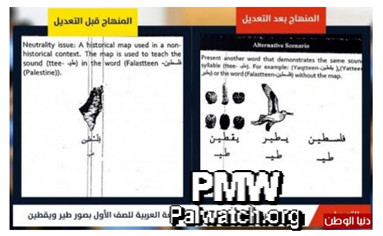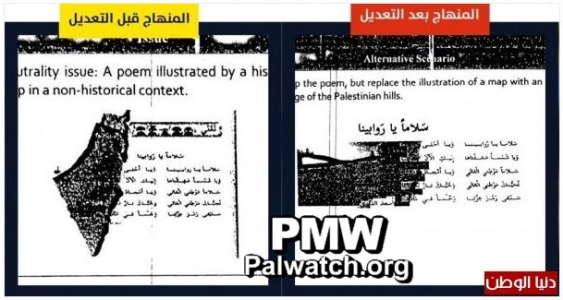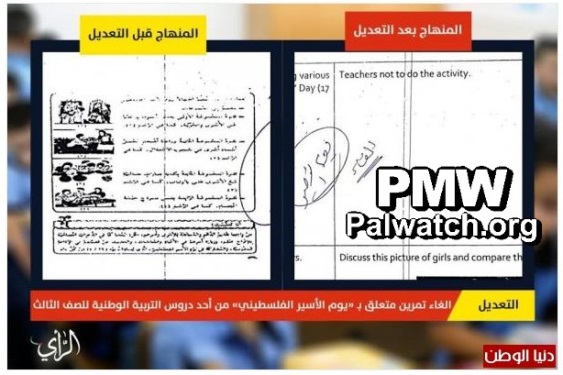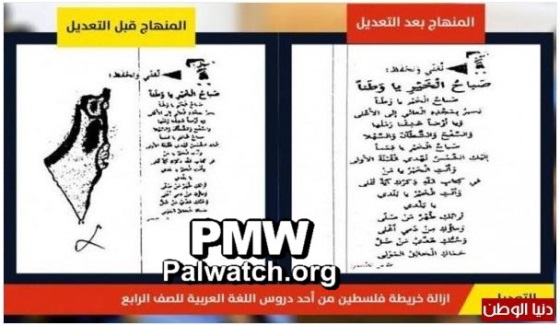PA Ministry of Education rejects UNRWA recommendations for changes in school books
Headline: “In documents: Accusations against UNRWA for targeting the national aspect of the textbooks”
“Ever since the characteristics became clear of the new [textbook] edition that UNRWA (UN Relief and Works Agency for Palestine Refugees in the Near East) has distributed to its teachers, which includes changes in the new textbooks for grades 1-4, a great indignation has arisen among all sectors of the Palestinian society who have said that these are changes that harm the Palestinian identity and perpetuate the occupation’s existence…
This is not the first time that UNRWA is accused of inserting terms into the Palestinian textbooks for students of its schools, as this matter came up several years ago when it tried to insert the term ‘Holocaust’ into the seventh grade national study material…
The [PA] Ministry of Education and Higher Education re-emphasized its firm opposition to any change or correction in the Palestinian textbooks, after it was disseminated that UNRWA is attempting to do this. The ministry said in a statement, a copy of which reached [the independent Palestinian news agency] Donia Al-Watan, that according to international law UNRWA must use the textbooks of the host country. The ministry explained that it will take ‘punitive steps’ against anyone who attempts to change the textbooks or manipulate them.
The ministry explained that any attempt to change the textbooks constitutes an attack against Palestine and a targeting and erasing of the national identity. It emphasized that what was reported indicates a direct targeting of the national aspect of the textbooks, in a manner that is consistent with the occupation’s plan that warps and distorts these books.
The ministry called on the [UNRWA] agency to clarify its position, to immediately turn to the relevant officials in the ministry, and not to submit to the pressures of the occupation, because our textbooks are a symbol of our sovereignty and we will never allow them to be targeted and warped.
It should be noted that [PA] Minister of Education [and Fatah Central Committee Deputy Secretary] Sabri Saidam said last Wednesday [March 22, 2017] that ‘The ministry will not agree to a change or distortion of textbooks by any institution, whether it is UNRWA or other bodies.’…
Head of the parents’ council at the UNRWA schools Zaher Al-Bana warned against the agency’s plan [and said that] ‘It erases the Palestinian identity through changes that it is attempting to insert into the textbooks.’
He said in a press statement: ‘The goal of the plan is to erase and replace every expression of the Palestinian identity and heritage, the map (i.e., the PA map of “Palestine” that presents all of Israel as “Palestine” together with the PA areas), Jerusalem, the racist separation fence, and so on, and to replace them with other terms.’
He added: ‘We as parents emphasized to UNRWA’s department of education that we do not agree to this and that we oppose this plan and will act to thwart it. If the existence of a book including these materials in the schools becomes known to us, we will take it and destroy it.’
He noted that the goal of the changes is ‘to brainwash the Palestinian students, to erase the culture of the [previous] generations and their connection to their homeland and cause, to establish the culture of normalization and living together in peace, and to distance the students from the Palestinian resistance.’
The edition and all of the study topics do not present the symbolism of Jerusalem as the capital of Palestine, but rather only as the city of the three monotheistic religions, while weakening the Islamic presence within it and not addressing the Israeli checkpoints that prevent the Muslims from reaching the holy city [of Jerusalem] (sic., Muslims in the West Bank are allowed to pass through the checkpoints to Jerusalem).
Likewise, any text connected to the occupation’s acts of oppression against the Palestinian people, like the racist separation fence, settlement, demolition of homes, daily executions, arrests , and the names of the Israeli detention centers, was erased and replaced.
In addition, the edition does not note Prisoner’s Day or names of prisoners, does not connect the Jordan Valley region to Palestine, and omits the Palestinian heritage.”
The article includes a number of images of pages from the textbooks, showing the old edition on the left side with “The textbook before the change” written above it, and the new edition with suggested changes on the right with “The textbook after the change” written above it.

The first image shows a page from before the change with the PA map of “Palestine” that presents all of Israel as “Palestine” together with the PA areas, and a page with suggestions for changing it.
Text on bottom of image: “The change: Replacing the map of Palestine in the first grade Arabic language book with a picture of a bird and a pumpkin”
The page before the change includes the following text in English: “Neutrality issue: A historical map used in a non-historical context. The map is used to teach the sound (ttee) in the word (Falastteen (Palestine)).”
The page shows the PA map of “Palestine” and below it the word “Palestine” and the letters “ttee.”

The second image shows the PA map of “Palestine” being replaced by an image of hills.
The page before the change includes the following text in English: “Issue
Neutrality issue: A poem illustrated by a historical map in a non-historical context.”
The page after the change includes the following text in English: “Alternative Scenario
[Kee]p the poem, but replace the illustration of a map with an image of the Palestinian hills.”

The third image shows another suggested change in the textbook.
Text at bottom of image: “The change: Cancelling what is connected to ‘Palestinian Prisoner’s Day’ from one of the national education lessons for third grade”

The fourth image shows another suggested change in the textbook to remove the PA map of “Palestine.”
Text at bottom of image: “The change: Removing the map of Palestine from one of the Arabic language lessons for fourth grade”
“Ever since the characteristics became clear of the new [textbook] edition that UNRWA (UN Relief and Works Agency for Palestine Refugees in the Near East) has distributed to its teachers, which includes changes in the new textbooks for grades 1-4, a great indignation has arisen among all sectors of the Palestinian society who have said that these are changes that harm the Palestinian identity and perpetuate the occupation’s existence…
This is not the first time that UNRWA is accused of inserting terms into the Palestinian textbooks for students of its schools, as this matter came up several years ago when it tried to insert the term ‘Holocaust’ into the seventh grade national study material…
The [PA] Ministry of Education and Higher Education re-emphasized its firm opposition to any change or correction in the Palestinian textbooks, after it was disseminated that UNRWA is attempting to do this. The ministry said in a statement, a copy of which reached [the independent Palestinian news agency] Donia Al-Watan, that according to international law UNRWA must use the textbooks of the host country. The ministry explained that it will take ‘punitive steps’ against anyone who attempts to change the textbooks or manipulate them.
The ministry explained that any attempt to change the textbooks constitutes an attack against Palestine and a targeting and erasing of the national identity. It emphasized that what was reported indicates a direct targeting of the national aspect of the textbooks, in a manner that is consistent with the occupation’s plan that warps and distorts these books.
The ministry called on the [UNRWA] agency to clarify its position, to immediately turn to the relevant officials in the ministry, and not to submit to the pressures of the occupation, because our textbooks are a symbol of our sovereignty and we will never allow them to be targeted and warped.
It should be noted that [PA] Minister of Education [and Fatah Central Committee Deputy Secretary] Sabri Saidam said last Wednesday [March 22, 2017] that ‘The ministry will not agree to a change or distortion of textbooks by any institution, whether it is UNRWA or other bodies.’…
Head of the parents’ council at the UNRWA schools Zaher Al-Bana warned against the agency’s plan [and said that] ‘It erases the Palestinian identity through changes that it is attempting to insert into the textbooks.’
He said in a press statement: ‘The goal of the plan is to erase and replace every expression of the Palestinian identity and heritage, the map (i.e., the PA map of “Palestine” that presents all of Israel as “Palestine” together with the PA areas), Jerusalem, the racist separation fence, and so on, and to replace them with other terms.’
He added: ‘We as parents emphasized to UNRWA’s department of education that we do not agree to this and that we oppose this plan and will act to thwart it. If the existence of a book including these materials in the schools becomes known to us, we will take it and destroy it.’
He noted that the goal of the changes is ‘to brainwash the Palestinian students, to erase the culture of the [previous] generations and their connection to their homeland and cause, to establish the culture of normalization and living together in peace, and to distance the students from the Palestinian resistance.’
The edition and all of the study topics do not present the symbolism of Jerusalem as the capital of Palestine, but rather only as the city of the three monotheistic religions, while weakening the Islamic presence within it and not addressing the Israeli checkpoints that prevent the Muslims from reaching the holy city [of Jerusalem] (sic., Muslims in the West Bank are allowed to pass through the checkpoints to Jerusalem).
Likewise, any text connected to the occupation’s acts of oppression against the Palestinian people, like the racist separation fence, settlement, demolition of homes, daily executions, arrests , and the names of the Israeli detention centers, was erased and replaced.
In addition, the edition does not note Prisoner’s Day or names of prisoners, does not connect the Jordan Valley region to Palestine, and omits the Palestinian heritage.”
The article includes a number of images of pages from the textbooks, showing the old edition on the left side with “The textbook before the change” written above it, and the new edition with suggested changes on the right with “The textbook after the change” written above it.

The first image shows a page from before the change with the PA map of “Palestine” that presents all of Israel as “Palestine” together with the PA areas, and a page with suggestions for changing it.
Text on bottom of image: “The change: Replacing the map of Palestine in the first grade Arabic language book with a picture of a bird and a pumpkin”
The page before the change includes the following text in English: “Neutrality issue: A historical map used in a non-historical context. The map is used to teach the sound (ttee) in the word (Falastteen (Palestine)).”
The page shows the PA map of “Palestine” and below it the word “Palestine” and the letters “ttee.”
The page on the right with suggested changes includes the following text in English: “Alternative Scenario
Present another word that demonstrates the same sound syllable (ttee). For example: (Yaqtteen) (i.e., “pumpkin” in Arabic), (Yatteer) (i.e., “fly” in Arabic) or the word (Falastteen) without the map.”
The page shows an image of a pumpkin and under it the word “Pumpkin” and the letters “ttee,” an image of a flying bird and under it the word “Fly” and the letters “ttee,” and a blank space and under it the word “Palestine” and the letters “ttee.”
Present another word that demonstrates the same sound syllable (ttee). For example: (Yaqtteen) (i.e., “pumpkin” in Arabic), (Yatteer) (i.e., “fly” in Arabic) or the word (Falastteen) without the map.”
The page shows an image of a pumpkin and under it the word “Pumpkin” and the letters “ttee,” an image of a flying bird and under it the word “Fly” and the letters “ttee,” and a blank space and under it the word “Palestine” and the letters “ttee.”

The second image shows the PA map of “Palestine” being replaced by an image of hills.
The page before the change includes the following text in English: “Issue
Neutrality issue: A poem illustrated by a historical map in a non-historical context.”
The page after the change includes the following text in English: “Alternative Scenario
[Kee]p the poem, but replace the illustration of a map with an image of the Palestinian hills.”

The third image shows another suggested change in the textbook.
Text at bottom of image: “The change: Cancelling what is connected to ‘Palestinian Prisoner’s Day’ from one of the national education lessons for third grade”

The fourth image shows another suggested change in the textbook to remove the PA map of “Palestine.”
Text at bottom of image: “The change: Removing the map of Palestine from one of the Arabic language lessons for fourth grade”